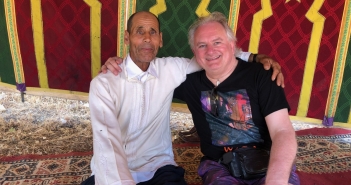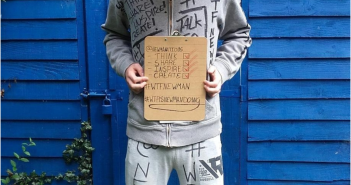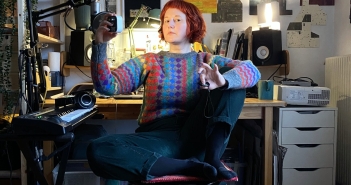Singin’ Songs and Stories
My name is Gemma Dunleavy and I’m a yapper. I’d talk the handle off a cup. I also write and play music. I see myself as a storyteller first, then a musician. It’s where I feel my true gift is, my natural comfort is in meandering through my memories, picking out the best details to paint the clearest picture in the heads of those listening.
I’m from Sheriff Street in Dublin 1. My whole family grew up there and I still live there now. Like any inner city community there’s the good and the bad. The flats had problems with drugs and crime being rampant during the ‘90s. The heroin epidemic tore through the area and claimed the lives of many young, unemployed, and vulnerable people that were left to rot by the system. The skeletons of that epidemic still haunt us today. There were many effects of this: lives were lost, families destroyed, crime in the area rose, and the resulting social stigma from outside the community. The most important side effect was something different: resilience. People had nothing else but each other, no other options but to push through and that’s what we did and continue to do up to this day. Our community is rich in spirit, hope, and support. We have some of the best talent: athletes (boxer Pierce O’Leary), writers and artists (see ADUANTES by poet Michelle Byrne and painter Tara Kearns – playwright Sean O’Casey lived here too), and a string of musicians and directors hailing from our area (Luke Kelly and others). I’m extremely proud of where I’m from and my desire to preserve our community and protect it from aggressive redevelopment will never diminish.
I learned the value of a good story from a young age – I grew up in between my two nannies and their friends talking around the sitting room table. They would talk about living in the tenements and their memories there, describe the poor conditions and tragedies with a smile on their faces, and a gleam in their eyes, as if they were chatting about green meadows and clear skies. They spoke with such fondness you could almost feel the warmth from their bodies. They were proud women with strong roots and they made me proud to be from Sheriff Street. I loved their sense of togetherness, the laughs, and the community. Growing up with them meant growing up in a community, being raised by a community of people – something that’s not so common anymore. Through telling my own story I saw parallels between myself and them, finding comforts in things that from the outside might sound jarring. I had an aha! moment where in some strange way I was in my own version of their tenements. Their voices saying “We had nothing but we had it all” made sense.
I delved into my memories to tell five of the most important stories I had. Each story was from a different perspective based on a stereotype I grew up around. I dressed each one in chords and melody – and I had the help of the gritty voices that shaped my childhood. I tied it all together under the name of Up De Flats. For the concept I created five characters based on friends, family, neighbours, and myself. I would step into each of these characters and tell their story for each song. Before any of this became music, I gave each character a name and I’m going to take a moment to introduce you to these characters whose names haven’t yet stepped outside of my head (until now):
Chantelle is a seventeen-year-old from Sheriff Street. She goes out with Dayo, a fella who is a couple years her senior. He’s mysterious. People never quite know what he’s up to exactly but it’s probably not good. He’s not shy of a police chase, but he never gets caught. Chantelle knows his moves but he protects and respects her and their nights cruising down the Boundary Wall in the car where they can forget about everyone else are enough to show her he’s for her only. The boys on the street respect him and all the girls fancy him – he has street cred, making him feel all the more desirable to Chantelle. Edel is a desperate mother whose son has fallen victim to the heroin epidemic. “He’ll never change, but I made him this way” she wails as she describes him as a beautiful setting sun while watching him fade away from the devastating effects of drugs.
Paulie is a young man who’s grown up in the flats with his single mother and six siblings. Being the eldest, he was often left to raise his siblings as alcoholism took over his mother after his father’s death by suicide. He spent his later teenage years in detention centres and has only ever earned money through drugs and robberies. Now out of prison, his past means he will always be looking over his shoulder – but he will never let anyone in because in his eyes, the pain he has suffered is enough of a weapon to wipe anyone out. And if it was necessary that’s what he would do. He has a stern look – no one would dare cross him – but he would die for his siblings, and grandmother whose voice he hears at night when he’s alone and scared telling him, “It’s alright, son. I’m here”.
Kelly is a young single mother tired of the cyclical patterns of working class life. Her three kids, and the housing crisis, make it hard for her to ever get on her feet. She longs to be able to escape to a better life but is locked in the social welfare system. When times get hard she’s plagued by memories of her brother’s face who she lost to suicide. With pride as high as the sky, she’ll never let anyone know how she’s feeling, coming off as a fun-loving, strong mother who sometimes gets tired, but never gets low.
The last story is a love letter to my community and the only one that is fully from my own perspective. I was a young girl who had to move away to pursue her career and in doing that I realised that everything that people search all over the world for had always been on my doorstep: a sense of purpose. I reminisced about the soundtrack of the summer getting played by the police sirens and the blue lights flashing through my window at night being something that calmed me down.
Making this release was a tough – yet cathartic – journey to go on, down the dark and dreary, soft and warm lanes of my memory. At times it was hard, revisiting certain memories, but I felt privileged to finally understand and be able to articulate my frustration at the classist discrimination and prejudice that effects working class areas in Dublin. There was a fire burning inside me to give a voice to the other side of the traits these stereotypes were often demonised for. Behind the anger, the frustration, the addiction, and the crime was a common denominator: pain. I wanted to give a voice to that pain to show all our flaws and beauty, vulnerability, and rawness. I wanted to strip back all our layers because I know no hearts like the hearts I’ve grown up around in my community. I wanted to reveal our characters in a space where we weren’t going to be demonised.
I had no idea when I began shaping these stories that they would become my debut EP, but four months later, the stories have been listened to thousands of times, falling on many different ears. Something I’m so, so grateful for. For years, the media and authorities slandered us and we had no voice. But now, people are finally listening.
For more about Gemma’s work see:
Bandcamp: http://gemmadunleavy.bandcamp.com/album/up-de-flats
Facebook: https://www.facebook.com/gemmadunleavymusic/
Instagram: https://www.instagram.com/gemmadunleavy_/?hl=en
Twitter: https://twitter.com/gemmadunleavy1
Spotify:




